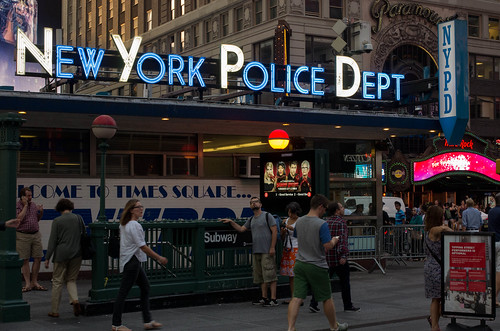Reprinted from fair.org by JULIE HOLLAR
The analysis presented the need for a police-based solution as indisputable -a position that is, in fact, highly disputed.
German Lopez (New York Times, 1/18/22) argues that the "short-term fixes" for a rise in murder involve "more focused policing, targeting the people and places most likely to be violent."
Lopez describes an increase in the murder rate over 2020 and 2021 (which, it's worth pointing out, is still lower than it was from 1970 through 1996) and explains that victims are disproportionately Black, framing his analysis in terms of racial justice:
The violence remains a grave example of racial inequality in the US. We have real solutions, with strong evidence, to deal with the problem, experts said. But those solutions need support from the public and lawmakers to go anywhere.
Lopez appears to see himself as working to right a wrong here, helping to inform the public about concrete solutions that will address racial inequality. And yet one of his central theories-that a policing "pullback" helped drive rising homicides, so police are a necessary part of the solution-not only rests on very shaky ground, its prescription entails heavy costs in terms of racial justice that Lopez refuses to consider.
Lopez cites zero Black sources about the causes or the solutions. Aside from a woman from Chicago who simply describes her experience of hearing gunshots in her neighborhood, his other three named sources are white professors of criminology and public safety.
Lopez says "experts" point to "three broad explanations" for the increased murder rate: "the pandemic," "changes in policing" and "more guns." Two of these are fairly straightforward: Gun sales and carrying greatly increased, which one would expect to increase the number of murders, since numbers of guns correlate with numbers of homicides. And the pandemic disrupted social services and safety nets that help prevent violence.
As for "changes in policing," Lopez explains:
The fallout from the 2020 racial justice protests and riots could have contributed to the murder spike. Police officers, scared of being caught in the next viral video, may have pulled back on proactive anti-violence practices. More of the public lost confidence in the police, possibly reducing the kind of cooperation needed to prevent murders. In extreme circumstances, the lack of confidence in the police could have led some people to take the law into their own hands-in acts of street or vigilante violence.
It's a theory (sometimes called "the Ferguson Effect") that hinges on an awful lot of "could have"s, "may have"s and "possibly"s. It's extremely popular among police chiefs and their boosters who, seeking to defend against movements challenging police violence, deflect blame back onto protesters.
Questioning the timingAfter introducing the possibilities, Lopez turns to sorting out the likelihood of each. He argues that "timing" undermines the pandemic hypothesis, since "the murder spike took off in May and June 2020, months after Covid began to spread in the US," and "other countries didn't experience similar spikes during the pandemic." Meanwhile, the same timing "supports" the policing explanation, because, he says, the murder rate rose "unusually quickly shortly after George Floyd's murder and the ensuing protests," and killings increased in 2015 and 2016 "after protests over policing during those years."
The comparison to other countries is not terribly useful without much more fine-grained analysis, as it ignores their wide range of differences in terms of their governmental response to the pandemic and other factors that impact violent crime: inequality, lack of social safety nets and availability of guns.
As for timing, as Karakatsanis (Twitter, 1/20/22) points out, experts are very hesitant to speculate about short-term effects on crime because of the complex interacting factors. In fact, there's even a great deal of uncertainty about the factors impacting historical, long-term crime rates. But there's plenty to cast doubt on the protest/policing explanation. Murder rates are seasonal, lower when it's cold (as when lockdowns started) and peaking every summer-the same time police protests have historically happened. Previous research hasn't found an impact of "de-policing" on homicide. And there's a great deal of diversity across cities when you take apart the data: NYC and LA, for instance, which both had major BLM protests, didn't experience unusual homicide surges immediately afterwards.
(Note: You can view every article as one long page if you sign up as an Advocate Member, or higher).





